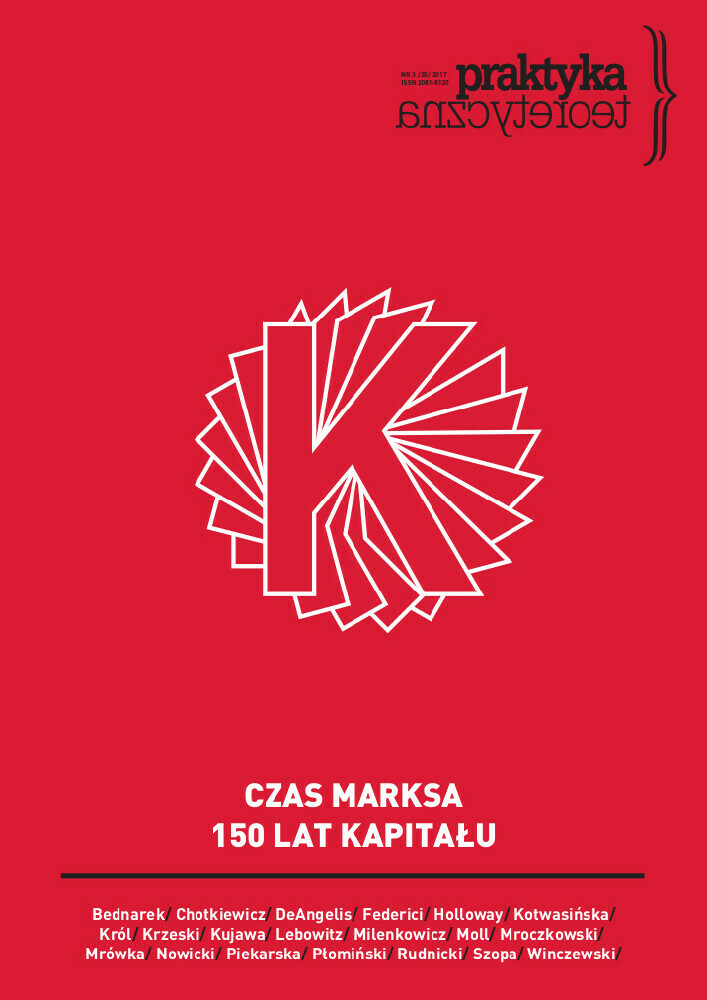Abstract
Agential realism is a perspective situated within the new materialism and posthumanism which combines philosophical and physical issues. Karen Barad, feminist thinker and creator of agential realism, mixes poststructuralist ideas (Michel Foucault) and feminist critical theories with quantum physics, in particular with the thesis of Niels Bohr, one of the founders of this field. The main purpose of this article is to show the relations between agential realism and ideas presented by Deleuze and Guattari in one of their most famous books – Anti-Oedipus. The author of the paper focuses on the presentation of a processual ontology (especially on an explanation of how bodies, concepts, and objects are produced) resulting from the engagement of both perspectives.References
Barad, Karen. 2007. Meeting the Universe Halfway: Quantum Physics and the Entanglement of Matter and Meaning. Durham: Duke University Press Books.
Barad, Karen. 2012. „Posthumanistyczna performatywność: ku zrozumieniu, jak materia zaczyna mieć znaczenie”. Tłum. Joanna Bednarek. Teorie wywrotowe. Red. Agnieszka Gajewska. Poznań: Wydawnictwo Poznańskie.
Deleuze, Gilles i Félix Guattari. 2017. Anty-Edyp. Tłum. Tomasz Kaszubski. Warszawa: Wydawnictwo „Krytyki Politycznej”.
Deleuze, Gilles, i Félix Guattari. 2015. Tysiąc plateau. Red. meryt. Joanna Bednarek. Warszawa: Fundacja Nowej Kultury Bęc Zmiana.
Foucault, Michel. 2012. Kim pan jest, profesorze Foucault?. Tłum. Kajetan Maria Jaksender. Red. Bartłomiej Błesznowski, Kajetan Maria Jaksender, Krzysztof Matuszewski. Kraków: Wydawnictwo Eperons-Ostrogi.
Foucault, Michel. 2009. Nadzorować i karać. Tłum. Tadeusz Komendant. Warszawa: Wydawnictwo Aletheia.
Ven der Tuin, Iris i Rick Dolphijn. 2012. New Materialism. Interviews & Cartographies. Ann Arbor: Open Humanities Press.
License
“Theoretical Practice” seeks to put into practice the idea of open access to knowledge and broadening the domain of the commons. It serves the development of science, thinking and critical reflection. The journal is published in open-access mode under the CC-BY-NC-SA 4.0 license (detail available here: http://creativecommons.org/licenses/by-nc-sa/4.0/). Articles published in the journal may be freely distributed, stored, printed and utilized for academic and teaching purposes without restrictions.
They should not be, however, used for any commercial purposes or be reconstructed into derivative creations. Access to the journal may not be limited or offered for a fee by any third party.
Prospective authors are obliged to fill in, sign and send back the publishing contract compliant with the CC licencing. [PL.pdf, PL.doc, EN.pdf,EN.doc].
According to this contract, authors grant the journal a non-exclusive right to publish their work under the creative commons license (CC-BY-NC-SA 4.0) without any financial obligation on both sides of the contract.
Before submission authors should make sure that derivative materials they use are not protected by copyright preventing their non-commercial publication. Authors are responsible for any respective copyright violations.
